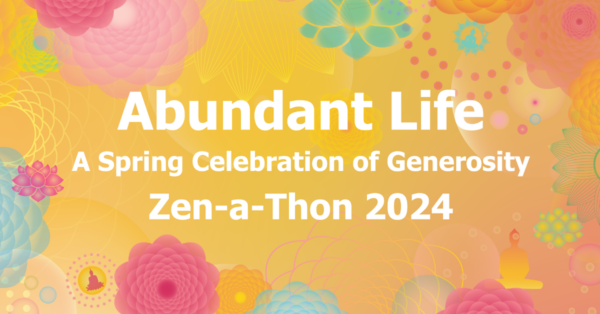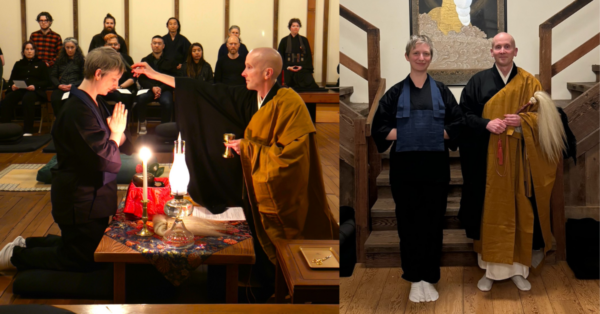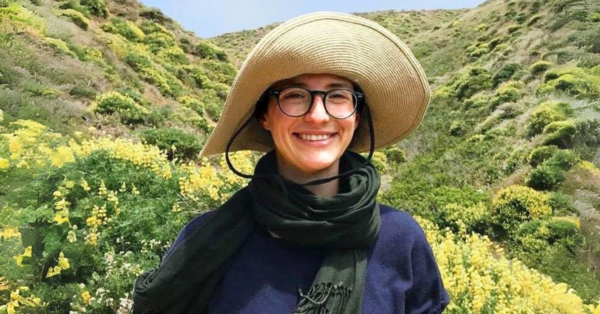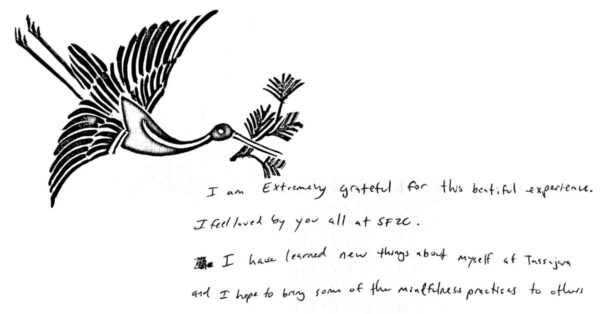Enlightenment is intimacy with all things. —Eihei Dogen
Robert Thurman’s reputation precedes him, and in this interview he does not disappoint. A scholar and writer by trade, the recipient of an endowed chair in Buddhist Studies at Columbia University, and a former student and enduring close friend of the Dalai Lama, he brings decades of Buddhist scholarship to bear on a very personal and universal topic, intimacy.
What did the Buddha say about this most wondrous and sensitive of worldly experiences? In this two-part interview, Robert Thurman discusses Buddhist ideas as they pertain to intimate relationships, moving effortlessly from the mundane to the universal. Like many of us, he admits to grappling with anger and jealousy and not yet being enlightened. Through the synthesis of his scholarship and experience of life, he puts it simply: “bliss comes from the surrender or transcendence of self-grasping.”
PART 1
What are the benefits of intimacy? The benefits of intimacy have to do with finding yourself in others and expanding your self-centeredness, so that you think of the perspective of others almost reflexively. You don’t feel your own identity is challenged, and you don’t feel invaded or disturbed by being aware of what other people are feeling and thinking. You automatically have a broader view of any contact with anyone, even a casual interaction, which people might not think of as being intimate. You feel close to other people, because you see yourself from their perspective automatically, without being paralyzed with self-consciousness.
This is the heart of Buddhism, of course, because the second noble truth shows that the source of all of our suffering comes from excessive self-grasping and self-focus. We call this the self-habit: the self-identity habit, closely connected to the self-importance habit, the self-cherishing habit, the self-preoccupation habit, and all those kinds of things. We have lots of terms for this in, let’s call it, Buddhist psychology.
The first benefit of intimacy is where you fulfill the basic nature of humanity, and you move toward the nature of enlightenment, which is to think of yourself as more than a skin-enclosed being. You feel the feelings of others as at least equal to your own. Since there are more others, you are naturally more preoccupied with others. You shift your focus of attention toward altruism, almost automatically. It isn’t that you feel you are going to be a saint and perform charitable acts. It is altruism because you see what they want and how they see things. When they feel unhappy about the way things seem, that bothers you. Because you feel how they feel, you don’t want them to feel unhappy. In this way you become happier.
According to the famous teaching of Shantideva, Dalai Lama, Buddha and Nagarjuna, you practice what is called the exchange of self-preoccupation for other-preoccupation, which is a cumbersome way of saying altruism. You exchange selfishness for altruism, which right away makes you feel happier, and as a result, you have a form of enlightened self-interest. As the Dalai Lama says, being selfish means you want something for yourself, you want to be happy. And, if you want to be happy effectively, then think about other people’s happiness and you will be. Think about your own happiness only, and you will always be dissatisfied because you will never have enough.
So, wise selfishness is fulfilling the selfish aim of happiness by forgetting about your happiness and being concerned with the happiness of others. Any degree of intimacy that you can develop with other beings leads to your own happiness through being concerned for their happiness.
What are the disappointments of intimacy? Disappointment comes when you are not really complete in your altruism. It is hard for us to be complete in our altruism because we are not enlightened beings automatically and easily. We have a lot of self-identity habits, and so our attention to the other is mixed with a desire to use them as objects or subjects or somehow agents of our happiness. When they balk at that and therefore we don’t get enough from them, we are disappointed.
Someone might say, it’s not that I am using her/him to secure my own happiness, it is just that s/he is such a pain. S/he is aggressive with me and mean to me. Even though I want her/him to be happy, s/he behaves badly and make me unhappy and disappointed. We externalize and say the other person is the source of our disappointment. But actually, if we focused only on the other’s happiness as a true altruist would, we would be concerned with her/his problem and we won’t be disappointed. We would think we should act to prevent her/him from being unpleasant from her/his unhappiness.
This is where my Buddhist wish is to reinforce the wonderful and, in my view, psychologically profound statement of Jesus, “Love your enemies.” Unfortunately, I think the Christian culture for the most part, except for some saintly monastics in the past and some unusual individuals in the present, thinks it’s impractical: Love your enemies. Oh, how can we do that. Oh, that’s ridiculous. No one can do that. I feel that way myself sometimes, when I am particularly mad or somebody has just dropped a bomb on somebody else or they just dropped a bomb on me.
But actually, it’s very practical because if your enemy is someone who has disappointed you extremely, and is making the effort of being unpleasant to you, that means your enemy isn’t happy. Being unpleasant always makes the person who is being unpleasant feel unpleasant. When you’re unpleasant, you are emanating “unpleasant” so you are apt to feel it first, actually. Love, understood like maitri in Buddhism as being true love, is just the wish for the happiness of the beloved. And if that is the case, then when the enemy is being nasty, you are upset that they are unhappy and you want them to be happy so you love them.
And that doesn’t mean that you just smile and grin idiotically at someone who is punching you in the face. It might be that it is not good for them to punch you in the face, so you might defend or deflect the punch. You might back away or run away. You might hold them from punching, if you can do that without infuriating them more. Whatever you do, you won’t be hating them, attacking back and being unpleasant to them.
You might even be aggressive in a certain way if you are capable of that without anger and without hatred, because there is such a thing as tough love. Sometimes to make someone else happy, it’s better to prevent them from doing something that is going to make them unhappy. It is better for them. And there are extreme cases we would call surgical violence, like if someone is bitten by a snake and they are freaking out. If you are a boy scout or a bush doctor you take a knife and cut a cross in their arm, which is very unpleasant, and suck the poison out of their bloodstream before it goes up their arm toward their heart. That’s violent, cutting with the knife, but you are saving their life. That’s tough love.
In intimate relationships, in which the stakes seem to be higher and we want more from one another, what are the Buddhist ideas that can help? When we have closer intimate relationships, maybe a marital relationship or lover relationship where sexuality is involved, then we assume we want more from each other. And, there’s the rub. This is where the Buddhist idea of true love helps. True love is where you want the happiness of the beloved; it’s not that you want something from the beloved. You just want to give to the beloved. Shantideva said, “All the joy the world contains has come through wishing happiness for others. All the misery the world contains has come through wanting happiness for oneself.”
Every year in my Introduction to Buddhism class at Columbia College, when we read Shantideva’s The Way of the Bodhisattva, I issue them the “Shantideva Challenge.” I read that verse to them, and then I ask them when they have had real happiness from just wanting their own happiness. We analyze different scenarios, at the end of which we discover that, though they thought they got happy by being out to get their own happiness, the happiness actually occurred only when their desire for their own happiness was blown away by the experience.
But they don’t easily come to this perspective, and in resisting, of course, they eventually get to sexuality. Some brave guys will talk about masturbation and other things, or they talk of sexuality as wanting their own happiness and then having a great time. I always end up chiding them, which makes them laugh. And then I refer them to a sex therapist, because if they just want their own happiness, then in a way the beloved is nothing but a kind of object which they are trying to get something out of for themselves. They are not getting the real experience of melting into the other person. That’s when you give up grasping for anything yourself, when you really let go and really have pleasure. I try to help them with an analysis like that. I call it the “Shantideva Challenge.”
 You seem to be describing an evolved love. What if you are in a relationship in which you would like the love with that other person to evolve to a higher level? What did the Buddha say about this type of growth? Or, did he say? The Buddha was a monk, and he was talking to other monks. Like Atiśa’s famous story in Tibet. Atiśa was asked by the kings, the Tibetan nobles, oh, please give us some marriage counseling. Atiśa kept saying I am a monk, I don’t do marriage counseling. But they bugged him and bugged him. And finally, he said okay, if you want marriage counseling, here it is: Husband and wife, each of them will soon be dead. Therefore while still alive, they should be more kind to each other.
You seem to be describing an evolved love. What if you are in a relationship in which you would like the love with that other person to evolve to a higher level? What did the Buddha say about this type of growth? Or, did he say? The Buddha was a monk, and he was talking to other monks. Like Atiśa’s famous story in Tibet. Atiśa was asked by the kings, the Tibetan nobles, oh, please give us some marriage counseling. Atiśa kept saying I am a monk, I don’t do marriage counseling. But they bugged him and bugged him. And finally, he said okay, if you want marriage counseling, here it is: Husband and wife, each of them will soon be dead. Therefore while still alive, they should be more kind to each other.
I jump to an extreme to show that bliss comes from the surrender or transcendence of self-grasping. That is the basic Buddhist insight. Nirvana indeed comes from seeing through the pretension of the exaggerated importance of the self and realizing that one’s self is also everyone else. Not, I am all it; it’s all me. No. Everyone else is what one is.
Buddha is, as they say, that vision of one who sees every single being like a mother looks at her only beloved child—every being including cockroaches, ants and microbes, whatever it is. Buddha has that preoccupation that a mother has of feeling that the child is more than her. It is the essential biological quality that enables mammals to give life, share your body or die for your offspring. Buddha feels like that for all beings. That’s a way of saying enlightenment is an encompassment of other beings.
Those sorts of supreme principles, I think, are not out of place in discussing the closeness in a family or among ordinary people, because it is the ideal, the direction of that supreme principle that then leads to the tiny baby step, incremental self-giving, self-surrender, trying to be more open, not insisting on being right, not insisting on being the better one, etc. All that give and take at the micro level is the one. Those baby steps are what make up that good relationship, the enduring relationship.
The essence of being in love is probably where people really do give up themselves and just love the beloved, like Romeo and Juliet who die over one another in a terrible tragedy. When each one thinks the other one is dead, they are ready to die for the other one.
But then there is the wanting of requital, which mixes with it. There’s that moment in the passionate relationship when the honeymoon is over, as they say. One or the other of the lovers or both at the same time start to think, maybe I’m more in love with her than she is with me, or she thinks maybe I am more in love with him than he is with me. There is something about him, he is holding back. He’s like this. She’s like that. Then the honeymoon is over because they are just thinking about what they are getting out of it. I guess the ordinary egocentric person, who is not a Buddha, brings that to a relationship and is temporarily overwhelmed.
But I think that’s a great thing. I mean the fact that the human being can get so carried away with passion that they will practically destroy themselves over it means that we are very close to Buddha. It shows the ability of a being to be completely in love with another, whether requited or not. Then it becomes a question of how to sustain and concentrate that expansion of empathy without being destroyed and without necessarily imposing something on anyone else. How to expand from that?
It’s important that people who are on an enlightened path—which doesn’t have to be a Buddhist path, it could be Christian, Confucian, Hindu, Taoist, whatever it is—somehow connect the passion of the falling in love with the enduring passion of expanding their self-centeredness and inviting the partner to expand their self-centeredness. Although each is willing to give whatever the partner wants, each knows what the partner needs is to be less self-centered, in order to be happier. You don’t get that way by lecturing your partner; you get there just by being that way yourself.
In the I-Ching they even say that in marriage it’s very important that the partners share primarily a con-spiritual commitment to the Tao and that their partnership is not just what they get out of each other, as lovers, husbands, partners, mates, parents, etc. But, their partnership is how they help each other get closer to the Tao.
[iframe width=”420″ height=”315″ src=”https://www.youtube.com/embed/C7KpPxpR3lI” frameborder=”0″ allowfullscreen></iframe]
__________
In Part 2 of this interview, Dr. Thurman addresses “healthy attachment,” trust, repairing feelings of violation and more.
(interview by Sachico Ohanks, SFZC Communications Coordinator)













